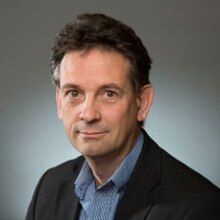Martin Freer

Martin Freer is a British Nuclear Physicist, professor. He is the CEO of the Faraday Institution.[1] He was previously head of the School of Physics and Astronomy[2] at the University of Birmingham.[2] He won the 2010 Rutherford Medal and Prize for establishing the existence of nuclear configurations analogous to molecules.[3]
Education
[edit]BSc (Hons) Maths and Physics, Aston University, 1987.[2]
PhD in Nuclear Physics, University of Birmingham, 1991.[2]
University of Birmingham
[edit]From 2015 until 1 July 2019, Martin Freer was the head of the School of Physics and Astronomy at the University of Birmingham.[2]
He is also the director of the Birmingham Centre for Nuclear Education and Research,[4] whose purpose is to provide the investment and infrastructure to grow the nuclear expertise and capacity in Birmingham,[5] as well as the Director of the Birmingham Energy Institute[6] which seeks to develop sustainable energy solutions in transport, electricity and heat supply.
He featured in the Universities Birmingham Heroes campaign for "championing UK investment in clean-cold technologies amid concern that global demand for cooling and refrigeration will overtake heating by 2060."[7]
Works
[edit]- Hans O. U. Fynbo, Martin Freer, "Viewpoint: Rotations of the Hoyle State in Carbon-12", Physics 4, 94 (2011) | doi:10.1103/Physics.4.94
References
[edit]- ^ "Professor Martin Freer appointed Chief Executive Officer of the Faraday Institution". www.faraday.ac.uk.
- ^ a b c d e "Professor Martin Freer, School of Physics and Astronomy - University of Birmingham". www.birmingham.ac.uk.
- ^ "2010 Rutherford medal and prize". www.iop.org.
- ^ "Martin Freer, Professor of Nuclear Physics". www.np.ph.bham.ac.uk.
- ^ "About Us - Birmingham Centre for Nuclear Education and Research - University of Birmingham". www.birmingham.ac.uk.
- ^ "Birmingham Energy Institute". www.birmingham.ac.uk.
- ^ "Energy Crisis". www.birmingham.ac.uk.
